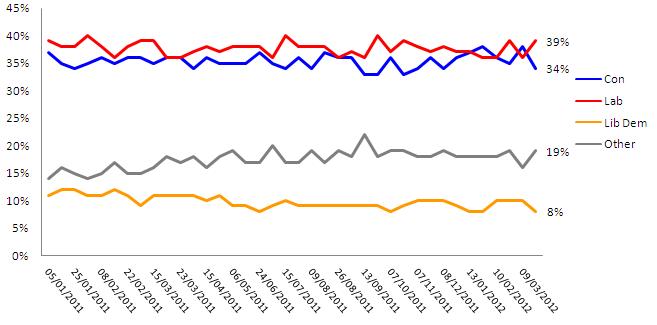Voting Intention – 21st March
21st March 2012
- In the first Opinium poll after the budget, Labour took a 5 point lead while the Lib Dems drop to 4th place behind UKIP.
- After showing a Tory lead in our March 9th poll, the blue and red lines have moved in exactly opposite directions with Labour moving up to 39% while the Tories drop to 34%
- Prime Minister David Cameron’s approval rating has slipped from 40% to 37% but he still has more support from his own party than either of the other two major party leaders. 86% of Conservative voters approve of Mr Cameron compared to 42% of Labour voters who approve of Ed Miliband and 51% of Lib Dem voters who approve of Nick Clegg
- The Lib Dems have dropped to 8% and 4th place behind the UK Independence Party (UKIP) who are on 9%
- Among the 19% who would support “some other party”, fully 48% chose UKIP
Topline Voting Intention
| † | % | Change |
| Conservative | 34 | -4 |
| Labour | 39 | +3 |
| Liberal Democrats | 8 | -2 |
| Other parties | 19 | +3 |
Other Parties (breakdown)
| † | % | Change |
| UKIP | 9 | +2 |
| Green | 3 | n/c |
| SNP | 3 | n/c |
| BNP | 2 | n/c |
| Plaid Cymru | 1 | +1 |
| Other | 1 | n/c |
Approval ratings
| † | % Approve | % Disapprove | Net rating | Net rating (own party) |
| David Cameron | 37% | 45% | -8% | +83% |
| Ed Miliband | 20% | 45% | -25% | +20% |
| Nick Clegg | 16% | 54% | -38% | +31% |

Opinium Research carried out an online survey of 1,957 GB adults aged 18+ from 21st to 23rd March 2012. Results have been weighted to nationally representative criteria.
Interview Method and Sample
This survey is conducted online by CAWI (computer aided web interviewing), using Opinium?s online research panel of circa 30,000 individuals. This research is run from a representative sample of GB adults (aged 18+ in England, Scotland and Wales). The sample is scientifically defined from pre-collected registration data containing gender, age (18-34, 35-54, and 55+), region (North East, North West, Yorkshire and Humberside, East Midlands, West Midlands, East of England, London, South East, South West, Wales, and Scotland), working status and social grade to match the latest published ONS figures.
Opinium also takes into account differential response rates from the different demographic groups, to ensure the sample is representative.




